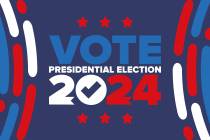Titus stands behind campaign ads
Criticism that ads from her campaign and independent supporters are misleading doesn't faze Rep. Dina Titus.
Titus, D-Nev., is considered among the most vulnerable incumbents in the House of Representatives as she seeks to fend off a challenge from Republican Joe Heck, a physician, Army reservist and former state senator.
In doing so, Titus and her supporters have run television ads attacking Heck that contain claims and use selective editing tactics nonpartisan observers have declared misleading.
On Wednesday Titus said she stands behind the ads in question, which could be a factor in the outcome of the 3rd Congressional District race polls show is a statistical tie.
"I certainly do," said Titus in response to whether she stood behind ads , including one that used a truncated quote from Heck to make it appear as if he is against job creation.
Heck made the statement on the show Nevada Newsmakers.
The ad uses a clip of Heck saying, "The role of Congress is not to create jobs."
It doesn't continue as Heck finishes his statement by explaining his view that the role of Congress is to create an environment for private businesses to create jobs by keeping tax rates stable and regulations spare.
Nevada Newsmakers host Sam Shad said during an episode aired Wednesday that the clip was used out of context and that he asked Titus to take down the ad. The show is nonpartisan and doesn't advocate for or against candidates, he said.
Titus stood by her use of the clip when asked whether cutting off Heck's statement made the ad misleading.
"I don't see that as cutting off the clip," Titus said.
She continued: "The second part of his statement was a whole different point, it was some kind of mushy reiteration of the Bush mantra, which is lower taxes and less regulation. That doesn't have anything to do with 'create jobs' so I stand by it."
Titus stood by other contested claims as well, including those in an ad produced by the American Federation of State, County and Municipal Employees that claimed Heck is "dangerous to women."
The claim is based in part on the suggestion Heck "voted against cancer vaccine," which isn't true.
Heck didn't vote against a cancer vaccine, he voted against a requirement that insurance companies cover a particular brand of vaccine for HPV, a precursor to cervical cancer.
"It is not even misusing what I said," Heck said after the ad was released. "It is totally changing what I said."
Titus hedged when asked about the specific claim that Heck is dangerous to women.
"You can make your own decision about that," she said. "But I certainly stand by the fact he voted against the bill to have insurance companies cover a vaccine for a virus that causes cervical cancer. He was opposed to it."
The nonpartisan political watchdog site FactCheck.org called the cancer claim and "dangerous to women" line in the union ad an example of "over-the-top" rhetoric.
FactCheck also criticized as false a claim that signers of an anti-tax pledge from Americans for Tax Reform agreed to "tax breaks for companies that send jobs overseas." The pledge, signed by Heck, is a broad promise to keep taxes at or lower than current levels, and doesn't mention specific tax breaks, credits, incentives or jobs.
Titus said since Americans for Tax Reform has opposed tax breaks Democrats say encourage moving jobs overseas, Heck's signature on the pledge from the group justifies the claim.
But FactCheck.org contends justification for the claim from the Democratic Congressional Campaign Committee doesn't hold water because the loophole in question relates to foreign havens from U.S. taxes, not jobs, and adds that other elements of the tax code that provide incentive for moving jobs overseas have a negligible effect on U.S. jobs.
The incentive for politicians to use misleading ads is strong, said Brendan Nyhan, a political scientist at the University of Michigan.
Nyhan has studied misleading political claims and found that once people believe incorrect information they are unlikely to change their views, even when presented with facts to rebut the inaccurate statements.
"Our research suggests that it is very difficult to correct misleading claims," Nyhan said. "When people want to believe something, even if it is not true, it is hard to convince them otherwise."
With the economy in shambles and the Democratic majority facing stiff political challenges in 2010, Nyhan says the environment is ripe for more misleading political ads.
"The endangered incumbents are going to spend their money, they don't have a winning positive message right now," Nyhan said. "If you don't have a winning positive message, you try to individualize the race and go as negative as you can. In a lot of cases the problem is it is not just negative, it is misleading and negative."
Contact reporter Benjamin Spillman at bspillman@reviewjournal.com or 702-477-3861.




























